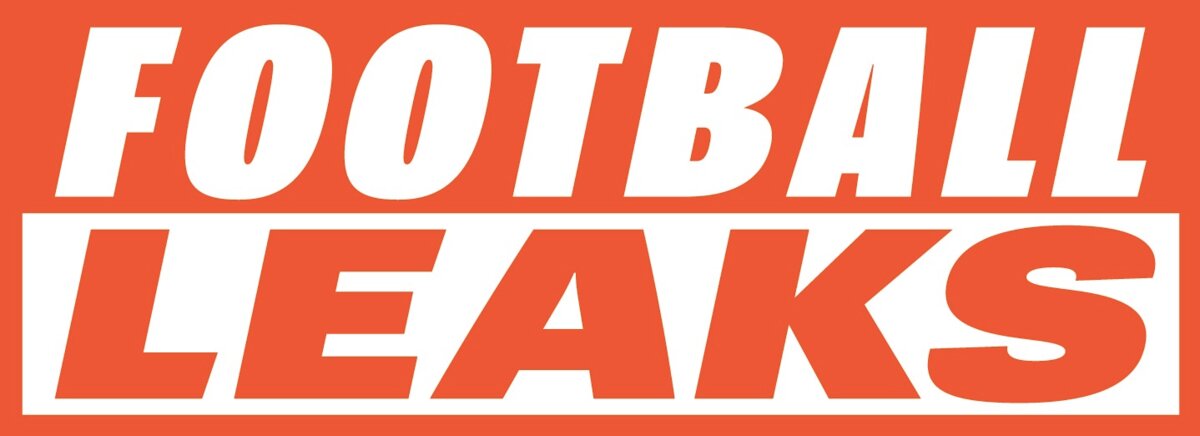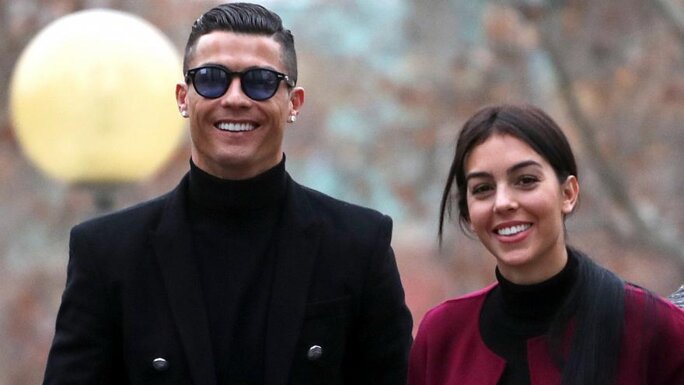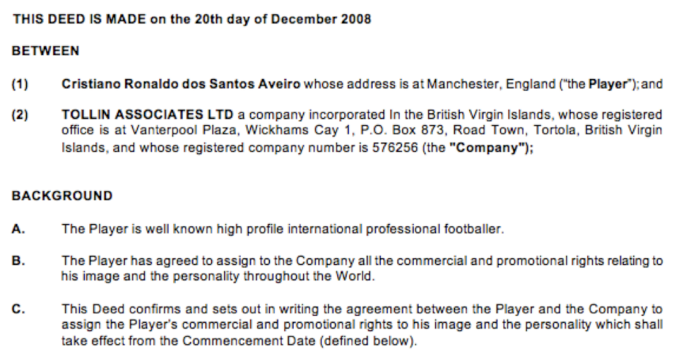Portuguese footballer Cristiano Ronaldo was sentenced for tax fraud on Tuesday by a Madrid court, when he was ordered to pay an 18.8 million-euro fine and handed a 23-month suspended prison sentence after he admitted evading tax payments of 14.8 million euros between 2011 and 2014 when he was a player with Real Madrid.
The case resulted in part from documents from the whistleblowing Football Leaks project, revealed in December 2016 by Mediapart and its partners in the European Investigative Collaborations (EIC) media consortium, and which disclosed how the superstar placed almost 150 million euros of earnings in tax havens.

Enlargement : Illustration 1

Ronaldo, 33, who spent nine years at Spanish club Real Madrid until moving to Italian side Juventus last July, had reached a deal with Spanish prosecutors and tax authorities last year which was effectively rubber stamped by the Madrid court on Tuesday. If the player had denied the tax evasion, he would have faced trial and the possibility of a seven-year jail sentence if found guilty.
Contacted by the EIC, a Spanish judicial source claimed the settlement was regarded as the surest option to reclaim Ronaldo’s unpaid taxes given the difficulty in proving the player had knowingly avoided paying the sums.
Speaking to French magazine France Football in December 2016, shortly after the EIC revealed how remunerations on image rights were hidden in offshore financial structures, Ronaldo said: “There are a lot of innocent people in prison. And I feel a little bit like that. You know you have done nothing wrong, and they say you have done something reprehensible.”

Enlargement : Illustration 2

But in June last year, the EIC began revealing that a key document that was produced by Ronaldo’s lawyers as evidence of his good faith, reproduced below, was in fact falsified.
Payments to the Portuguese star from image rights deals were funnelled into a shell company called Tollin based in the British Virgin Islands, a tax haven. The structure was conceived by the leading football agent Jorge Mendes, whose GestiFute company represents both players and managers and which used similar offshore systems for payments made to manager José Mourinho and players Angel Di Maria and Ricardo Carvalho, as revealed in the investigation by Mediapart and the EIC in December 2016 (see here). Subsequent to the Football Leaks revelations, several of those cited were to admit to unpaid taxes.
In Ronaldo’s case, the system of hidden payments involved the services of accountants, frontmen and high-profile lawyers in Spain and Portugal. Seven of them, including agent Jorge Mendes, were investigated for complicity in the scheme but were later cleared of wrongdoing by the Spanish judicial authorities. However,
Between 2009, when he was transferred to Real Madrid from Manchester United, and 2013, Ronaldo made no declaration to the Spanish tax authorities of his remuneration from sponsors for use of his image rights.
In 2014, the Spanish tax authorities, the Agencia Estatal de Administración Tributaria (AEAT) launched investigations into the tax affairs of several footballers, including a number represented by Jorge Mendes. In his tax returns for 2014, Ronaldo suddenly declared earnings taxable income over a five-year period beginning in 2009, but made no mention of the shell company Tollin and the 149.5 million euros from sponsorship deals that was placed abroad, notably in the British Virgin Islands and Switzerland.
The AEAT discovered the existence of Tollin after it was mentioned in Ronaldo’s tax statement on his wealth and assets, and in 2016 requested clarification as to who owned the company. The player’s lawyers provided the name of another shell company that in fact served as a ‘frontman’ for the firm, which appeared to satisfy the AEAT that Tollin did not belong to Ronaldo.
Ronaldo was helped in his dealings with the AEAT by prestigious Madrid law firm Senn Ferrero (one of the whose partners, Julio Senn, had previously served as a director of Real Madrid), a collaboration initiated by Jorge Mendes’s Portuguese lawyer Carlos Osorio. In confidential documents revealed by Football Leaks, the law firm’s team are recorded as being delighted with the result over Tollin, which they had not expected.
Before creating their own law firm, Julio Senn and his associate Javier Ferrero were employed by Spanish law firm Garrigues. Mendes’s lawyer Carlos Osorio had contacted Garrigues in 2010 to request an evaluation of the offshore payment structure set up for Ronaldo and the potential legal risks involved.
A confidential presentation drawn up by Garrigues shows that the firm knew that Tollin belonged to Ronaldo, via a Panama-based foundation (see below). Six years later, neither Senn nor Ferrero volunteered that information to the Spanish tax authorities. Contacted by Mediapart’s EIC partner Der Spiegel on the subject of their knowledge about Ronaldo’s links to Tollin, the two lawyers failed to respond to the German weekly.

Enlargement : Illustration 3

Contacted by the EIC, law firm Garrigues said it had provided no advice concerning Cristiano Ronaldo’s tax situation.
Following the December 2016 revelations published by Mediapart and its EIC partners, the Spanish tax authorities asked for further clarification about Tollin from Ronaldo’s lawyers, who subsequently confirmed that the player was indeed the company’s owner.
Following that admission, the AEAT concluded that Tollin, which had no employees nor activity, was purely a shell company which served to hide remunerations paid to Ronaldo. Accordingly, the Portuguese player should have declared the sponsorship income paid into the British Virgin Islands company each year between 2009 and 2013.
But Ronaldo’s legal team were able to reverse the seemingly damning evidence with a document of a deal signed between Ronaldo and Tollin in 2008. Under the contract (see below), Tollin was to receive payments made by sponsors, but would only hand the payments over to Ronaldo in person in 2014. His lawyers argued that it was therefore quite normal that the five-time winner of the prestigious Ballon d’or (Golden boot) prize waited until 2014 before declaring these earnings, and that there was no intention on his part to commit tax fraud.

Enlargement : Illustration 4

However, the document was in fact backdated by six years, and had been signed only in late 2014 or early 2015. To all appearance it was drawn up in order to mislead the Spanish tax authorities.
It was mid-2014 when the AEAT began its investigations into the tax affairs of several stars of Spanish football, and Ronaldo appeared a likely target in the probes which had begun with verifications on a number of individuals represented by Mendes, including José Mourinho. Mendes’s lawyer Carlos Osorio, assisted by two lawyers from the Madrid branch of international law firm King & Wood Mallesons (KWM), were engaged on Ronaldo’s behalf.
A first version of the contract between Ronaldo and Tollin was drawn up towards the end of 2014. On December 11th 2014, a new, and still unsigned contract was sent by Carlos Osorio to the team of Ronaldo’s advisors. These included Luis Correia, a nephew of Jorge Mendes and principal assistant to the agent, along with Andy Quinn, an Irish accountant who managed Dublin-based companies associated with Mendes through which remunerations paid to Ronaldo transited before their transfer to the British Virgin Islands. The contract was also sent by Osorio to two Spanish lawyers from KWM.
Therefore Ronaldo could only have signed the contract after December 11th 2014, and not December 20th 2008 as indicated.
The document was cited during questioning of the Portuguese player by Spanish magistrates at a hearing in court in Pozuelo de Alarcón, close to Madrid, in July 2017. The prosecutor present at the session (see video below) quoted from an article published by Spanish daily El Mundo, which with its EIC partners had revealed initial evidence suggesting the contract had been backdated. After the presiding judge asked Ronaldo exactly when he had signed the contract, the Portuguese player’s lawyer present objected to the question on the basis that documents cited in the El Mundo article “could have been obtained illegally”. When the prosecutor asked Ronaldo if he could not recall the precise date of the signature, the player replied: “Yes, I have great trouble with dates.”
Ronaldo told the court that he had given his advisors the task of looking after his tax affairs in strict compliance with the law.
The falsification of the contract could have had serious consequences for the player. “To backdate documents presented to the tax authorities can be considered to be a falsification,” Carlos Cruzado, head of the Spanish tax inspectors’ union, told the EIC.
Contacted by the EIC, none of Ronaldo’s advisors involved with the contract – and who were never investigated by the Spanish authorities – agreed to comment on the case.
None of the advisors have been the object of police searches for evidence in the case, nor have the Spanish prosecution services made any attempt to contact “John”, the pseudonym given to the person who first transmitted the Football Leaks data documents to German weekly Der Spiegel and which were shared for analysis and further investigations with Mediapart and other partners in the EIC.
The EIC asked the Spanish public prosecution services and the AEAT to explain why they did not pursue investigations into the contract, but both declined to comment.
Meanwhile, uncertainty remains over the future of Rui Pinto, a Portuguese whistleblower linked to the Football Leaks revelations, who was arrested in Hungary last week after an arrest warrant was issued against him by the Portuguese authorities. Pinto, 30, who is accused by the Portuguese authorities of attempted extortion and data theft, was released on conditional bail and placed under house arrest after his appearance in court in Budapest on Friday, while awaiting a ruling on an extradition demand by Portugal.
Pinto is in part responsible for the prosecution of Ronaldo and the recovery of 18.8 million euros in lost tax payments, and has accepted to help separate investigations into tax fraud and suspected corruption by public prosecution services in France and Switzerland. In a joint statement issued after his arrest last week, Pinto’s French and Portuguese lawyers insisted he is a “whistleblower”, and denounced the move by the Portuguese authorities “to criminalise” his actions whereas he had contributed “to revealing to the world the extent of criminal practices”. They said Pinto “meets all the criteria for the protection of whistleblowers as laid down by the latest clauses of European law”.
-------------------------
If you have information of public interest you would like to pass on to Mediapart for investigation you can contact us at this email address: enquete@mediapart.fr. If you wish to send us documents for our scrutiny via our highly secure platform please go to https://www.frenchleaks.fr/ which is presented in both English and French.
------------------------------------------------------------------------------
- This is an abridged version of a report by Mediapart in French which can be found here.


